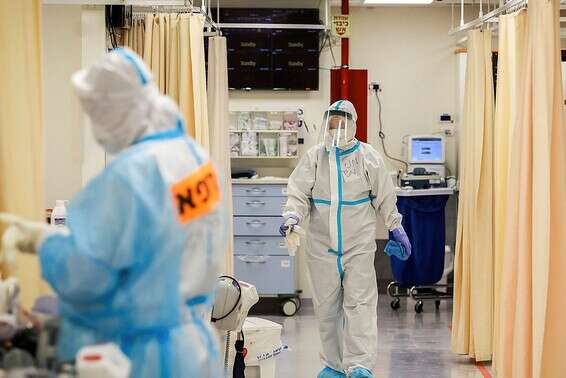According to a report published by the researchers, the recent increase in morbidity may be due to the expansion of trade activities and Hanukkah events. • According to them, at this stage it is almost impossible to avoid "tightening restraint" • Prime Minister Netanyahu:
Against the background of the increase in coronary heart disease in Israel, researchers at the Hebrew University of Jerusalem estimate that during January it will be difficult to avoid reaching about 1,000 patients in critical condition - and that by February between 800 and 1,600 people will die from the virus.
Health Minister Edelstein, today: Edelstein: "Calm about the quality of vaccines, we will fight the Pike News distributed by opponents" // Photo: Knesset Channel
In a report released by the researchers, they wrote that the increase in recent days may be due to the expansion of trade and Hanukkah events - and they fear that the trend will continue in the coming days. They say the current situation is similar to late August, before the closing of Tishrei. To reach the morbidity indicators set for the implementation of "tightened restraint", which they estimate is inevitable and will happen in about a week.
It is also written that the average daily mortality is expected to rise in the next few days to about 15 deaths per day by the end of the month, and that they see a rapid acceleration in infection among members of the ultra-Orthodox sector in general - and Bnei Brak in particular.
"There are behavioral characteristics per sector that lead to an increase in morbidity, morbidity is not controlled by location and morbidity is not controlled by geographic growth," the document said.
In addition, the researchers determined that in the past there was a time of morbidity migration between nearby cities for more than a week - and now it stands at only about four days.
The research team stated that in order to prevent an immediate increase in the infection rate and even reduce it while vaccinating groups at risk, "significant educational activity should be maintained. Only rapid and early implementation of the restrictions could allow significant education and partial commercial activity while promoting the vaccination program."
To combat the spread of the plague, they offer six steps: The first involves conducting extensive survey tests, including testing a teaching staff to reduce outbreaks in the education system.
The second step encourages work from home and a focus on researching commercial sites and closing such sites that are prone to infection.
According to the third step, in-depth investigations should be carried out to isolate entire adhesive chains and isolate disease centers.
The fourth step, according to university researchers, calls for increased awareness of restrictions and gatherings in the private space.
The fifth step seeks to oblige in isolation every person who returns from abroad, no matter where he comes from, and the sixth and final step requires to maximize the vaccination program against the corona.




